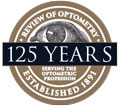 |
Optometrists in 2016 have abundant opportunity: to practice full-scope primary eye care, to learn new skills and connect with others at professional meetings, and to have their voices heard in the corridors of power. In short, to succeed.
None of those happened by chance. And none came easily. The profession you practice today is very much the product of the courageous, talented people who made it what it is—optometry’s path through history was not inevitable. It didn’t develop from the traditional medical institutions, so it didn’t have the advantage of their resources and respectability. Quite the contrary, of course: the medical establishment opposed it vigorously. Had it not been for leaders with passion and tenacity, optometry might never have evolved much
beyond optics and refraction.
Indulge in a little alternate history speculation and you’ll see:
- Remove Albert Fitch from the story and huge chunks of your optometric education go poof.
- Remove Charles Lembke and optometry loses cohesion and national identity.
- Remove Norman Haffner and your scope of practice shrinks.
- Remove Brien Holden and contact lenses get more painful for everyone.
- Remove Irv Borish and just try to get a decent manifest refraction.
- Remove Charles Prentice and it all collapses like a house of cards.
Dozens more names belong on such a list, needless to say.
We at Review of Optometry think it’s fair to say that if you remove Frederick Boger, you would see a ripple effect across all of the above—because this magazine wouldn’t have been chronicling and advocating and educating for the last 125 years. Boger was also a tireless proponent of a national organization and worked hard to found what is now the American Optometric Association.So, on our 125th anniversary we are breaking from our usual format for a deep dive into the past. Why? Because it’s a fascinating story, rich with drama. And because the future depends on it. Knowing the past shows us what’s possible.
This special issue is organized into four parts:
1. Beginnings offers perspective on the arc of history.
2. Then and Now looks at our early coverage of key clinical topics through the lens of 2016.
3. Events That Made Optometry recounts tumultuous transitions that altered the DNA of the profession.
4. Reflections shares the opinions and memories of old friends and long-time contributors to Review.
We hope you enjoy the chance to learn more about the people and events that shaped your world—and then maybe to reshape it yourself.

